#catholicism and women's history
Text
Last but not least, a look at the lives of medieval nuns:
The Clergy were the first estate in the threefold medieval European caste system, though in practice there was a very big difference between a village priest, who could be as literate as the peasants that dug the fields, and the great bishops, who were noblemen among clergy and as such both the driving force of the Church and the least religious parts of it in practice. Nuns, like monks, could and did vary greatly though nunneries, like monasteries, could and did become very wealthy. The difference between this factor of the medieval world and the long history that preceded it is that for the first time it opened up to a systematic, not the product of individual whim, education of at least some women.
These women innovated in things ranging from science and philosophy to needlework to working in and among the masses along with friars when this took off thanks to Francis of Assisi.
#lightdancer comments on history#women's history month#europe and women's history#catholicism and women's history#monasteries#nunneries
0 notes
Text
Yan!Husband Henry VIII Headcanons (Romantic)
❝ 👑 — lady l: This has been in my draft for a while but I decided to finish it now lol. Hope you like it! Forgive me for any mistakes. ❤️🧡
❝tw: obsessive and possessive behavior, toxic relationship, mention of death perhaps.
❝👑pairing: yandere!henry viii x female!reader.
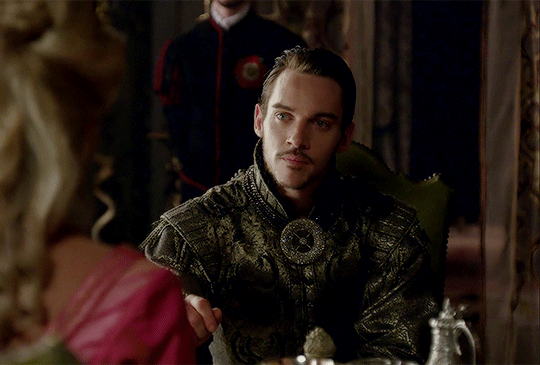
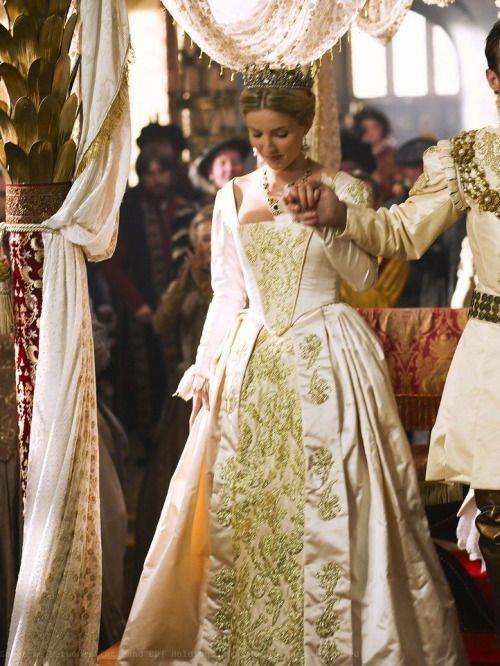
You had already dreamed of marrying a King, of becoming his Queen and giving birth to his heirs, a romantic fantasy that you and many other young women have dreamed of. They were mere fantasies of romance that you made up, but never really thought it would happen or become the obsession of one of the most infamous Kings in the history of England.
Your dreams remained as they were, dreams of a young lady. The King of the country where you lived was already married, so there wasn't much chance of you marrying him. Your family was of noble enough origin and had considerable wealth, but nothing too extravagant.
Until your older sister's marriage to a powerful man, close to the King. With that, your family immediately moved to the English Court, excited about their new status. Your father was particularly eager to marry you off to a powerful man as well.
Henry was dissatisfied with his wife, Anne, she had failed to conceive the much-desired male heir he so desperately wanted. His wandering eyes began to wander to the young women of the Court and when he laid eyes on you, he knew you would be the one to give him what he wanted.
Henry's captivating gazes seemed to follow you wherever you went and it began to unnerve you. A hint of excitement perhaps, but you knew it was a dangerous game to get involved with the King, especially when he was married.
Your parents were immensely happy with the King's interest in you. If you became his mistress, it would bring benefits and riches to your family. And when Henry got tired of you, you could perhaps marry a man with a noble title. Maybe a Duke or a Marquis.
But you didn't want to be his mistress or anyone's mistress. You wanted a husband and not a mere toy that he could always discard later. Your resistance angered your parents but attracted Henry even more. Your rejecting him has stirred him up, and bewitched him even more. Whenever you were in a room, Henry's eyes would be on you.
All of Henry’s attention was on you and you would be lying if you said you didn’t like it. He didn't even try to hide his affection for you, he sent you gifts and letters constantly. You reciprocated, sending him letters in return, but always remaining firm in your convictions.
Before long, Henry was deeply in love with you and quickly got rid off his current wife, Anne. When he asked you to marry him, shortly after his separation from Anne, you hesitated but accepted. You would finally become his and his alone.
Once you were married, Henry became more possessive than ever. He already didn't like the looks other gentlemen gave you, but now that you were officially his, it would be considered a crime of treason. And we know how he deals with betrayal.
You were his perfect Queen, so sweet and so, well, perfect. Henry makes a point of reminding you of that every day, about how perfect you were for him. He really was in love, so he kept on your side the whole time. His eyes remained only on you.
Henry truly values you and your opinion. It is not a custom, but he would be willing to listen to your wishes and political opinions (if you have any) on matters of state. You are his Queen, after all. If it was your wish, if you were Catholic, Henry could even try to restore Catholicism in England.
He really loved you, maybe not in the conventional way, but he did. Henry would listen to your wishes, fulfill them and all he wants in return is his love. He will not tolerate people speaking ill of you and will condemn anyone who does so for treason.
Henry would be loyal to you, he would take care of you until your death. He wants to have children with you, a family, a male heir, but he also wants to be with you. He could be himself and not the King of England.
And when you finally gave him his long-awaited male heir, Henry knew he would never let you go or let anything happen to you. After all, you are his wife and his Queen. And Henry doesn't handle treason very well.
#yandere history#yandere historical characters#history#the tudors#yandere the tudors#yandere henry viii#yandere Henry VIII x reader#yandere henry viii headcanons#henry viii x reader#headcanons#yandere headcanons
826 notes
·
View notes
Text
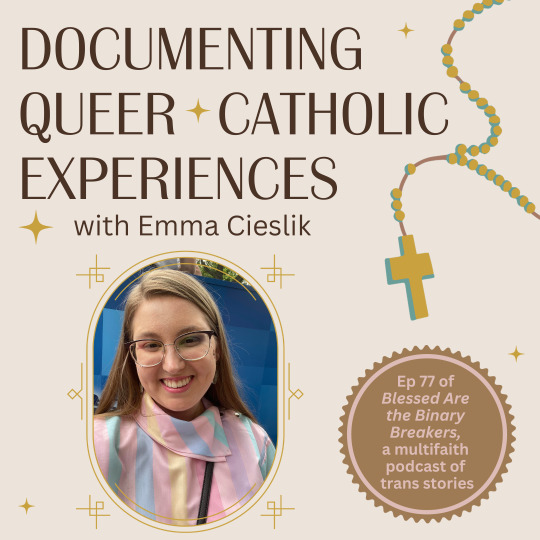
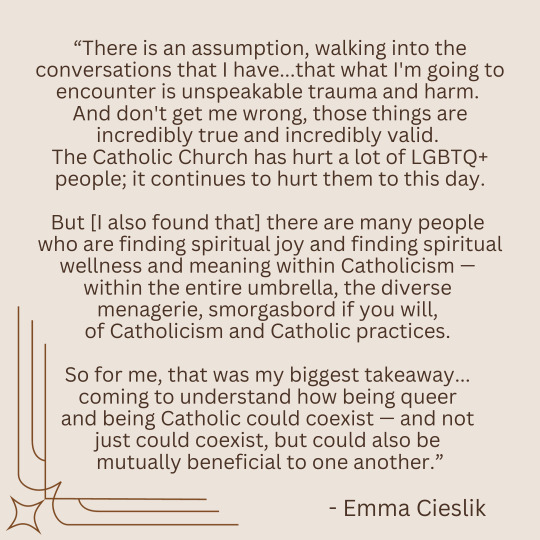
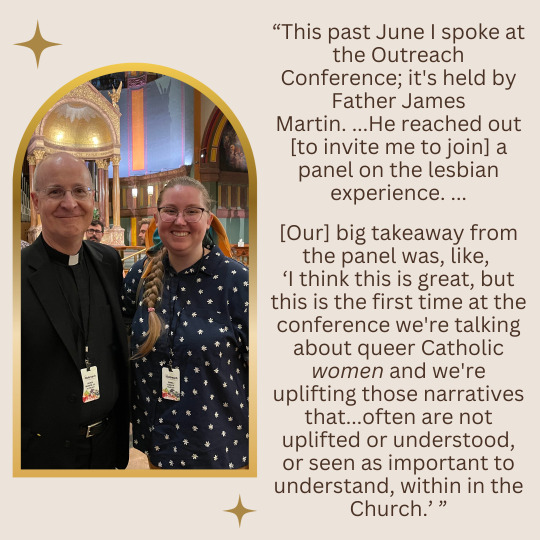
In the latest ep of Blessed Are the Binary Breakers, I sit down with public historian Emma Cieslik (she/her) to hear all about her Queer and Catholic Oral History Project, supported by the Pacific School of Religion.
For Emma, the word catholic is truly "universal" — she's interviewed Roman Catholics and folk Catholics, ex-Catholics and "it's complicated" Catholics, queer religious and lay folk. In documenting these diverse perspectives, Emma is preserving the beautiful breadth of queer Catholic stories and gifts so that no one can claim they don't exist.
Listen wherever you get podcasts, or click here for direct links + the episode transcript.
Image descriptions are under the readmore + in the alt text.
ID: Images are three infographics with cream colored backgrounds. First says "Documenting Queer Catholic Experiences with Emma Cieslik; Ep 77 of Blessed Are the Binary Breakers, a multifaith podcast of trans stories." A photo of Emma shows a smiling white person with long light brown hair, glasses, and a colorful pastel shirt.
Image two has a quote from Emma reading,
“There is an assumption, walking into the conversations that I have...that what I'm going to encounter is unspeakable trauma and harm. And don't get me wrong, those things are incredibly true and incredibly valid. The Catholic Church has hurt a lot of LGBTQ+ people; it continues to hurt them to this day. But [I also found that] there are many people who are finding spiritual joy and finding spiritual wellness and meaning within Catholicism —within the entire umbrella, the diverse menagerie, smorgasbord if you will, of Catholicism and Catholic practices. So for me, that was my biggest takeaway... coming to understand how being queer and being Catholic could coexist — and not just could coexist, but could also be mutually beneficial to one another.”
Image 3 has a final quote from Emma reading, “This past June I spoke at the Outreach Conference; it's held by Father James Martin. ...He reached out [to invite me to join] a panel on the lesbian experience. ...[Our] big takeaway from the panel was, like, ‘I think this is great, but this is the first time at the conference we're talking about queer Catholic women and we're uplifting those narratives that... often are not uplifted or understood, or seen as important to understand, within in the Church.’ ” A photo shows Emma smiling and posing with Father James Martin in a church. / end ID
#queer christians#queer catholics#gay catholics#faithfullylgbt#podcast#blessed are the binary breakers#oral history#queer and catholic oral history project
188 notes
·
View notes
Text
Nemoralia and the birthday of Goddess Diana

As I wasn't able to celebrate Nemoralia two days ago, I thought I'd make a post about it today. Nemoralia was a festival in honour of Goddess Diana. This festival was originally held at Diana's temple in Aricia, current day Nemi (50 minutes away from Rome by car).
May this informational post honor the goddess and help those that want to celebrate this festival.
August 13 - Diana's Dies Natalis
This was thought to be Diana's dies natalis (birthday) by members of the collegium of Diana and Antinous in Lanuvium.
Everyone took part in this festival though the main focus were women. As told by Plutarch, on this day, for reasons unknown nowadays, they washed their hair in a special ritual.
Enslaved people got this day off as they were under the protection of the goddess (worth to keep in mind that Diana's priest at Lake Nemi was always a runaway enslaved man). Male citizens and masters were able to participate in this festival but they were required to be on equal terms with women and enslaved people.
As this is one of the hottest days of the year, the celebrations started at night. Worshipers adorned not only their heads with flowers crowns, but also the heads of their dogs as they also took part in the celebration. Hunting or killing animals in any way was forbidden on this day. Horses were forbidden from entering this area.
At night, worshipers assembled at the Sanctuary and walked in a procession around Lake Nemi while holding candles or torches, similar to the ones Vestal Virgins carried. People wrote petitions on ribbons and tied them on tree branches and they also left votive offerings at the temple, especially related to part of the body in need of healing.
How to celebrate in current day
Make an offering to Diana. Some ideas are baking moon-shaped cakes, pouring wine, cutting a flock of your hair for her or lighting a special candle. You could also read a hymn in her honour.
Wash your hair or go to the hair salon to get a trim. Adorn it with flower crowns.
If you have a dog, pamper them!! Wash them, take them on a longer walk than usual, buy then special treats... The possibilities are endless.
Write your petitions in a ribbon and tie it in a tree branch. If you don't have any trees near you could also tie it to any plants you're growing at home or bury it in the ground.
Donate to good causes, foundations or shelters related to women, animals or those in need. The world really needs that right now.
If you are near Nemi, go to the ruins of the goddess' temple. People still give her flowers til this day. Also the council of Nemi celebrates Nemoralia since 2016, though I think this year was discontinued since I wasn't able to find any information about it.
The program is formed by different types of activities, from history or art lectures to guided tours or nature walks.


What's the actual date of Nemoralia?
There's a lot of confusion online about what the actual date of Nemoralia is, with some people saying it's only celebrated on the 13th, others saying it's on the 15th and others saying is a three day festival.
It's believed that at first it was celebrated on the full moon but during the Roman Republic it was set on August 13, as back then that's when the full moon happened. This has led modern scholars like Frazer to think that the festival may extended over a few days instead of just one.
So, when to celebrate? If you want to follow the Roman calendar, it should be on August 13. However, if you want to celebrate on a full moon like ancient worshipers would have, then it depends on the year (in 2024 it would be on August 19).
Additionally, since it's believed Nemoralia became the Assumption of Mary through syncretism with Catholicism, you may want to choose August 15 to celebrate, because if you live in a Catholic country or canton you'll most likely get a day off from work - which means more time to celebrate!
May Dea Diana bless you all!
#paganblr#paganism#witchblr#witchcraft#polytheism#polytheist#Diana#dea Diana#goddess diana#diana worship#diana devotee#roman polytheism#roman paganism#rompol#helpol
31 notes
·
View notes
Text
Why People Are Wrong About the Puritans of the English Civil War and New England
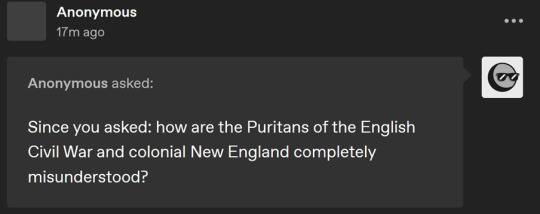



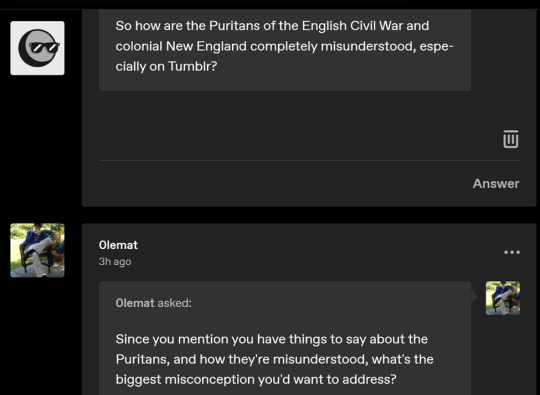
Oh well, if you all insist, I suppose I can write something.
(oh good, my subtle scheme is working...)
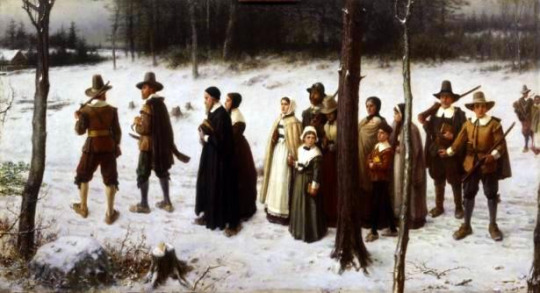
Introduction:
So the Puritans of the English Civil War is something I studied in graduate school and found endlessly fascinating in its rich cultural complexity, but it's also a subject that is popularly wildly misunderstood because it's caught in the jaws of a pair of distorted propagandistic images.
On the one hand, because the Puritans settled colonial New England, since the late 19th century they've been wrapped up with this nationalist narrative of American exceptionalism (that provides a handy excuse for schoolteachers to avoid talking about colonial Virginia and the centrality of slavery to the origins of the United States). If you went to public school in the United States, you're familiar with the old story: the United States was founded by a people fleeing religious persecution and seeking their freedom, who founded a society based on social contracts and the idea that in the New World they were building a city on a hill blah blah America is an exceptional and perfect country that's meant to be an example to the world, and in more conservative areas the whole idea that America was founded as an explicitly Christian country and society.
Then on the other hand, you have (and this is the kind of thing that you see a lot of on Tumblr) what I call the Matt Damon-in-Good-Will-Hunting, "I just read Zinn's People's History of the United States in U.S History 101 and I'm home for my first Thanksgiving since I left for colleg and I'm going to share My Opinions with Uncle Burt" approach. In this version, everything in the above nationalist narrative is revealed as a hideous lie: the Puritans are the source of everything wrong with American society, a bunch of evangelical fanatics who came to New England because they wanted to build a theocracy where they could oppress all other religions and they're the reason that abortion-banning, homophobic and transphobic evangelical Christians are running the country, they were all dour killjoys who were all hopelessly sexually repressed freaks who hated women, and the Salem Witch Trials were a thing, right?
And if anyone spares a thought to examine the role that Puritans played in the English Civil War, it basically short-hands to Oliver Cromwell is history's greatest monster, and didn't they ban Christmas?
Here's the thing, though: as I hope I've gotten across in my posts about Jan Hus, John Knox, and John Calvin, the era of the Reformation and the Wars of Religion that convulsed the Early Modern period were a time of very big personalities who were complicated and not very easy for modern audiences to understand, because of the somewhat oblique way that Early Modern people interpreted and really believed in the cultural politics of religious symbolism.
So what I want to do with this post is to bust a few myths and tease out some of the complications behind the actual history of the Puritans.
Did the Puritans Experience Religious Persecution?
Yes, but that wasn't the reason they came to New England, or at the very least the two periods were divided by some decades. To start at the beginning, Puritans were pretty much just straightforward Calvinists who wanted the Church of England to be a Calvinist Church. This was a fairly mainstream position within the Anglican Church, but the "hotter sort of Protestant" who started to organize into active groups during the reigns of Elizabeth and James I were particularly sensitive to religious symbolism they (like the Hussites) felt smacked of Catholicism and especially the idea of a hierarchy where clergy were a better class of person than the laity.
So for example, Puritans really first start to emerge during the Vestments Controversy in the reign of Edward VI where Bishop Hooper got very mad that Anglican priests were wearing the cope and surplice, which he thought were Catholic ritual garments that sought to enhance priestly status and that went against the simplicity of the early Christian Church. Likewise, during the run-up to the English Civil War, the Puritans were extremely sensitive to the installation of altar rails which separated the congregation from the altar - they considered this to be once again a veneration of the clergy, but also a symbolic affirmation of the Catholic doctrine of transubstantiation.
At the same time, they were not the only religious faction within the Anglican Church - and this is where the religious persecution thing kicks in, although it should be noted that this was a fairly brief but very emotionally intense period. Archbishop William Laud was a leading High Church Episcopalian who led a faction in the Church that would become known as Laudians, and he was just as intense about his religious views as the Puritans were about his. A favorite of Charles I and a first advocate of absolutist monarchy, Laud was appointed Archbishop of Canturbury in 1630 and acted quickly to impose religious uniformity of Laudian beliefs and practices - ultimately culminating in the disastrous decision to try imposing Episcopalianism on Scotland that set off the Bishop's Wars.
The Puritans were a special target of Laud's wrath: in addition to ordering the clergy to do various things offensive to Puritans that he used as a shibboleth to root out clergy with Puritan sympathies and fire them from their positions in the Church, he established official religious censors who went after Puritan writers like William Prynne for seditious libel and tortured them for their criticisms of his actions, cropping their ears and branding them with the letters SL on their faces. Bringing together the powers of Church and State, Laud used the Court of Star Chamber (a royal criminal court with no system of due process) to go after anyone who he viewed as having Puritan sympathies, imposing sentences of judicial torture along the way.
It was here that the Puritans began to make their first connections to the growing democratic movement in England that was forming in opposition to Charles I, when John Liliburne the founder of the Levellers was targeted by Laud for importing religious texts that criticized Laudianism - Laud had him repeatedly flogged for challenging the constitutionality of the Star Chamber court, and "freeborn John" became a martyr-hero to the Puritans.
When the Long Parliament met in 1640, Puritans were elected in huge numbers, motivated as they were by a combination of resistance to the absolutist monarchism of Charles I and the religious policies of Archbishop Laud - who Parliament was able to impeach and imprison in the Tower of the London in 1641.
This relatively brief period of official persecution that powerfully shaped the Puritan mindset was nevertheless disconnected from the phenomena of migration to New England - which had started a decade before Laud became Archbishop of Canterbury and continued decades after his impeachment.
The Puritans Just Wanted to Oppress Everyone Else's Religion:
This is the very short-hand Howard Zinn-esque critique we often see of the Puritan project in the discourse, and while there is a grain of truth to it - in the Massachusetts Bay Colony, the Congregational Church was the official state religion, no other church could be established without permission from the Congregational Church, all residents were required to pay taxes to support the Congregational Church, and only Puritans could vote. Moreover, there were several infamous incidents where the Puritan establishment put Anne Hutchinson on trial and banished her, expelled Roger Williams, and hanged Quakers.
Here's the thing, though: during the Early Modern period, every single side of every single religious conflict wanted to establish religious uniformity and oppress the heretics: the Catholics did it to the Protestants where they could mobilize the power of the Holy Roman Emperor against the Protestant Princes, the Protestants did it right back to the Catholics when Gustavus Adolphus' armies rolled through town, the Lutherans and the Catholics did it to the Calvinists, and everybody did it to the Anabaptists.
That New England was founded as a Calvinist colony is pretty unremarkable, in the final analysis. (By the by, both Hutchinson and Williams were devout if schismatic Puritans who were firmly of the belief that the Anglican Church was a false church.) What's more interesting is how quickly the whole religious project broke down and evolved into something completely different.
Essentially, New England became a bunch of little religious communes that were all tax-funded, which is even more the case because the Congregationalist Church was a "gathered church" where the full members of the Church (who were the only people allowed to vote on matters involving the church, and were the only ones who were allowed to be given baptism and Communion, which had all kinds of knock-on effects on important social practices like marriages and burials) and were made up of people who had experienced a conversion where they can gained an assurance of salvation that they were definitely of the Elect. You became a full member by publicly sharing your story of conversion (which had a certain cultural schema of steps that were supposed to be followed) and having the other full members accept it as genuine.
This is a system that works really well to bind together a bunch of people living in a commune in the wilderness into a tight-knit community, but it broke down almost immediately in the next generation, leading to a crisis called the Half-Way Covenant.
The problem was that the second generation of Puritans - all men and women who had been baptized and raised in the Congrgeationalist Church - weren't becoming converted. Either they never had the religious awakening that their parents had had, or their narratives weren't accepted as genuine by the first generation of commune members. This meant that they couldn't hold church office or vote, and more crucially it meant that they couldn't receive the sacrament or have their own children baptized.
This seemed to suggest that, within a generation, the Congregationalist Church would essentially define itself into non-existence and between the 1640s and 1650s leading ministers recommended that each congregation (which was supposed to decide on policy questions on a local basis, remember) adopt a policy whereby the children of baptized but unconverted members could be baptized as long as they did a ceremony where they affirmed the church covenant. This proved hugely controversial and ministers and laypeople alike started publishing pamphlets, and voting in opposing directions, and un-electing ministers who decided in the wrong direction, and ultimately it kind of broke the authority of the Congregationalist Church and led to its eventual dis-establishment.
The Puritans are the Reason America is So Evangelical:
This is another area where there's a grain of truth, but ultimately the real history is way more complicated.
Almost immediately from the founding of the colony, the Puritans begin to undergo mutation from their European counterparts - to begin with, while English Puritans were Calvinists and thus believed in a Presbyterian form of church government (indeed, a faction of Puritans during the English Civil War would attempt to impose a Presbyterian Church on England.), New England Puritans almost immediately adopted a congregationalist system where each town's faithful would sign a local religious constitution, elect their own ministers, and decide on local governance issues at town meetings.
Essentially, New England became a bunch of little religious communes that were all tax-funded, which is even more the case because the Congregationalist Church was a "gathered church" where the full members of the Church (who were the only people allowed to vote on matters involving the church, and were the only ones who were allowed to be given baptism and Communion, which had all kinds of knock-on effects on important social practices like marriages and burials) and were made up of people who had experienced a conversion where they can gained an assurance of salvation that they were definitely of the Elect. You became a full member by publicly sharing your story of conversion (which had a certain cultural schema of steps that were supposed to be followed) and having the other full members accept it as genuine.
This is a system that works really well to bind together a bunch of people living in a commune in the wilderness into a tight-knit community, but it broke down almost immediately in the next generation, leading to a crisis called the Half-Way Covenant.
The problem was that the second generation of Puritans - all men and women who had been baptized and raised in the Congrgeationalist Church - weren't becoming converted. Either they never had the religious awakening that their parents had had, or their narratives weren't accepted as genuine by the first generation of commune members. This meant that they couldn't hold church office or vote, and more crucially it meant that they couldn't receive the sacrament or have their own children baptized.
This seemed to suggest that, within a generation, the Congregationalist Church would essentially define itself into non-existence and between the 1640s and 1650s leading ministers recommended that each congregation (which was supposed to decide on policy questions on a local basis, remember) adopt a policy whereby the children of baptized but unconverted members could be baptized as long as they did a ceremony where they affirmed the church covenant. This proved hugely controversial and ministers and laypeople alike started publishing pamphlets, and voting in opposing directions, and un-electing ministers who decided in the wrong direction, and accusing one another of being witches. (More on that in a bit.)
And then the Great Awakening - which to be fair, was a major evangelical effort by the Puritan Congregationalist Church, so it's not like there's no link between evangelical - which was supposed to promote Congregational piety ended up dividing the Church and pretty soon the Congregationalist Church is dis-established and it's safe to be a Quaker or even a Catholic on the streets of Boston.
But here's the thing - if we look at which denominations in the United States can draw a direct line from themselves to the Congregationalist Church of the Puritans, it's the modern Congregationalists who are entirely mainstream Protestants whose churches are pretty solidly liberal in their politics, the United Church of Christ which is extremely cultural liberal, and it's the Unitarian Universalists who are practically issued DSA memberships. (I say this with love as a fellow comrade.)
By contrast, modern evangelical Christianity (although there's a complicated distinction between evangelical and fundamentalist that I don't have time to get into) in the United States is made up of an entirely different set of denominations - here, we're talking Baptists, Pentacostalists, Methodists, non-denominational churches, and sometimes Presbyterians.
The Puritans Were Dour Killjoys Who Hated Sex:
This one owes a lot to Nathaniel Hawthorne's Scarlet Letter.
The reality is actually the opposite - for their time, the Puritans were a bunch of weird hippies. At a time when most major religious institutions tended to emphasize the sinful nature of sex and Catholicism in particular tended to emphasize the moral superiority of virginity, the Puritans stressed that sexual pleasure was a gift from God, that married couples had an obligation to not just have children but to get each other off, and both men and women could be taken to court and fined for failing to fulfill their maritial obligations.
The Puritans also didn't have much of a problem with pre-marital sex. As long as there was an absolute agreement that you were going to get married if and when someone ended up pregnant, Puritan elders were perfectly happy to let young people be young people. Indeed, despite the objection of Jonathan Edwards and others there was an (oddly similar to modern Scandinavian customs) old New England custom of "bundling," whereby a young couple would be put into bed together by their parents with a sack or bundle tied between them as a putative modesty shield, but where everyone involved knew that the young couple would remove the bundle as soon as the lights were turned out.
One of my favorite little social circumlocutions is that there was a custom of pretending that a child clearly born out of wedlock was actually just born prematurely to a bride who was clearly nine months along, leading to a rash of surprisingly large and healthy premature births being recorded in the diary of Puritan midwife Martha Ballard. Historians have even applied statistical modeling to show that about 30-40% of births in colonial America were pre-mature.
But what about non-sexual dourness? Well, here we have to understand that, while they were concerned about public morality, the Puritans were simultaneously very strict when it came to matters of religion and otherwise normal people who liked having fun. So if you go down the long list of things that Puritans banned that has landed them with a reputation as a bunch of killjoys, they usually hide some sort of religious motivation.
So for example, let's take the Puritan iconoclastic tendency to smash stained glass windows, whitewash church walls, and smash church organs during the English Civil War - all of these things have to do with a rejection of Catholicism, and in the case of church organs a belief that the only kind of music that should be allowed in church is the congregation singing psalms as an expression of social equality. At the same time, Puritans enjoyed art in a secular context and often had portraits of themselves made and paintings hung on their walls, and they owned musical instruments in their homes.
What about the wearing nothing but black clothing? See, in our time wearing nothing but black is considered rather staid (or Goth), but in the Early Modern period the dyes that were needed to produce pure black cloth were incredibly expensive - so wearing all black was a sign of status and wealth, hence why the Hapsburgs started emphasizing wearing all-black in the same period. However, your ordinary Puritan couldn't afford an all-black attire and would have worn quite colorful (but much cheaper) browns and blues and greens.
What about booze and gambling and sports and the theater and other sinful pursuits? Well, the Puritans were mostly ok with booze - every New England village had its tavern - but they did regulate how much they could serve, again because they were worried that drunkenness would lead to blasphemy. Likewise, the Puritans were mostly ok with gambling, and they didn't mind people playing sports - except that they went absolutely beserk about drinking, gambling, and sports if they happened on the Sabbath because the Puritans really cared about the Sabbath and Charles I had a habit of poking them about that issue. They were against the theater because of its association with prostitution and cross-dressing, though, I can't deny that. On the other hand, the Puritans were also morally opposed to bloodsports like bear-baiting, cock-fighting, and bare-knuckle boxing because of the violence it did to God's creatures, which I guess makes them some of the first animal rights activsts?
They Banned Christmas:
Again, this comes down to a religious thing, not a hatred of presents and trees - keep in mind that the whole presents-and-trees paradigm of Christmas didn't really exist until the 19th century and Dickens' Christmas Carol, so what we're really talking about here is a conflict over religious holidays - so what people were complaining about was not going to church an extra day in the year. I don't get it, personally.
See, the thing is that Puritans were known for being extremely close Bible readers, and one of the things that you discover almost immediately if you even cursorily read the New Testament is that Christ was clearly not born on December 25th. Which meant that the whole December 25th thing was a false religious holiday, which is why they banned it.
The Puritans Were Democrats:
One thing that I don't think Puritans get enough credit for is that, at a time when pretty much the whole of European society was some form of monarchist, the Puritans were some of the few people out there who really committed themselves to democratic principles.
As I've already said, this process starts when John Liliburne, an activist and pamphleteer who promoted the concept of universal human rights (what he called "freeborn rights"), took up the anti-Laudian cause and it continued through the mobilization of large numbers of Puritans to campaign for election to the Long Parliament.
There, not only did the Puritans vote to revenge themselves on their old enemy William Laud, but they also took part in a gradual process of Parliamentary radicalization, starting with the impeachment of Strafford as the architect of arbitrary rule, the passage of the Triennal Acts, the re-statement that non-Parliamentary taxation was illegal, the Grand Remonstrance, and the Militia Ordinance.
Then over the course of the war, Puritans served with distinction in the Parliamentary army, especially and disproportionately in the New Model Army where they beat the living hell out of the aristocratic armies of Charles I, while defying both the expectations and active interference of the House of Lords.
At this point, I should mention that during this period the Puritans divided into two main factions - Presbyterians, who developed a close political and religious alliance with the Scottish Covenanters who had secured the Presbyterian Church in Scotland during the Bishops' Wars and who were quite interested in extending an established Presbyterian Church; and Independents, who advocated local congregationalism (sound familiar) and opposed the concept of established churches.
Finally, we have the coming together of the Independents of the New Model Army and the Leveller movement - during the war, John Liliburne had served with bravery and distinction at Edgehill and Marston Moore, and personally capturing Tickhill Castle without firing a shot. His fellow Leveller Thomas Rainsborough proved a decisive cavalry commander at Naseby, Leicester, the Western Campaign, and Langport, a gifted siege commander at Bridgwater, Bristol, Berkeley Castle, Oxford, and Worcester.
Thus, when it came time to hold the Putney Debates, the Independent/Leveller bloc had both credibility within the New Model Army and the only political program out there. Their proposal:
redistricting of Parliament on the basis of equal population; i.e one man, one vote.
the election of a Parliament every two years.
freedom of conscience.
equality under the law.
In the context of the 17th century, this was dangerously radical stuff and it prompted Cromwell and Fairfax into paroxyms of fear that the propertied were in danger of being swamped by democratic enthusiasm - leading to the imprisonment of Lilburne and the other Leveller leaders and ultimately the violent suppression of the Leveller rank-and-file.
As for Cromwell, well - even the Quakers produced Richard Nixon.
#history#puritans#calvinism#english civil war#oliver cromwell#the stupid meme about christmas#new england#protestantism
442 notes
·
View notes
Text
kink as religion/spirituality
it’s a little gauche to say something is “like a cult” - it’s overused as an expression
but a large problem i have with kink/bdsm subculture is the commonalities with religion, the spiritual aspects
when you think of precedents for “consensual” ritualized harm and self harm, they are religious (several groups have traditions of undergoing full on crucifixions for Easter, there’s similar rites for some Shia Muslims for Ashura - which is today I believe)
the desire for progression as some sort of internal challenge - there’s always a desire and encouragement to expand one’s limits
it’s driven by the same desire for a transcendent experience
the communities’ members have strange persecution complexes, gaslighting victims of abuse, especially when by higher ranking members
the focus on hierarchy (leather culture had formalized rules - serve in a house, train as submissive - tortured gay men wanting to punish themselves - maybe can read a form a Catholicism into this; modern kink culture is like modern Protestantism in that any sufficiently well groomed upper middle class man can claim to have the unique skills to be a good pastor/“dom” and open up a church/dungeon)
the repulsion towards former members/critiques of systemic issues present (expression anti kink opinions has gotten me the same kind of hateful response from other trans men that being a trans man did in the 2010s online - to the point where gendering people correctly appears to be optional for folks who are anti kink? the double whammy of being accused of being a TERF and than insulted with “girl” is always a fucking whiplash - can you not use the term “TERF” to mean “anyone i don’t like,” y’all look like fucking morons)
maybe many of these things can be applied to things like multi level marketing or any other extremely large organizational idea that people subsume their identity into, but the aspect of seeking “ecstasy” adds a hellish intensity to the mix
and like losing one’s religion, it’s difficult to leave. it’s difficult to part with the thought parties the beliefs. it’s difficult to justify to outsiders. (i agreed to let him do X but he did Y - the specifics don’t matter but it’s going to happen to you)
it creates mind bending cognitive dissonance - only puritanical criticisms of kink can be addressed. no matter what critique of kink you make, the response is
men are submissive too! (go actually look at femdom porn/hentai lol and see what they want or make a troll fet dom-F account if you don’t believe me + most submissive men are trans men with self esteem issues - the type who have boyfriends that refer to them as their girlfriend to their family; the religious analog would be something about complementary gender roles perhaps)
it’s all about consent! (what do we say about consent in power dynamics? now this is a subtle point, which is made impossible to address because it is such a fundamental threat to heterosexuality itself, that Dworkin tried to make and was glossed into “all sex is rape” because it is such a threat - what do we say to the idea of consent when we are fundamentally unequal human beings by nature of assigned sex of birth? who makes more money? who can overpower? i think most have gotten the picture that what Thomas Jefferson did to Sally Hemings was unambiguously rape, but what about all of the women throughout history when marital rape was considered the norm? it requires acknowledging that your great grandpa probably raped your great grandma, or up and down that line for thousands of generations - maybe if you acknowledge up front that gooners are going to want you to agree to humiliating and disgusting sex acts up front - that agreeing to have mutual fun with a stranger means rolling the dice on physical assault - maybe if you agree up front and pretend you can set some kinds of rules it’ll work out; similarly, religion is the comfort that life isn’t pointless suffering and maybe we’ll get to see our dog and grandma again if you follow these rules)
you can’t project your trauma onto the community/bad people aren’t doing really kink (i have a fairly large sampling size of kink partners and experiences personally. i genuinely don’t believe my arguments can be dialed down to “i had personal trauma in kink thus all kink is bad” unless one is taking my words at bad faith. this very much reeks of accusing atheists of hating god because of trauma or not getting what they want.)
you don’t actually believe that/you’re lying/you want it (these are obvious comparisons to religion)
these feel like the same kinds of responses i see to ex Mormons/Jehovah’s Witnesses/etc online
modern kink is similar to modern Protestantism in that it facilitates the creation of micro cults. institutionalization of kink is structured such that critique can be deflected onto individual actors. i’d argue Reddit is a major source of kink “education” - and no one can deny that subreddits can have concerning moderators. You have Fetlife, which is primarily heterosexual, male dom/female sub pornography. You have a couple of Booktok tier pop psych books which encourage Bronze Age marriage models. This maps to the diffuse ways in which American Protestantism propagates its ideas - it’s a nebulous mess of ideas that can evaporate when asked to take responsibility. We can’t hold all Christians accountable for Mark Driscoll’s ideas; we can’t hold all kinksters responsible for the actions of [insert the creeps who message you if you take up my suggestion of a troll fetlife account]. But can we not ask what it says about American Protestantism that Mark Driscoll exists and says what he says? And can we not look askew when what he said could be happily echoed by a kinkster as long as it was prefixed with “it’s kinky and consensual btw <3” and had been posted on fetlife anonymously - instead of his own church forum?
Kink is reactionary ideology which has parasitized societal acceptance of queer folks to justify the abusive dynamics of heterosexual relationships and sex, which has replaced religion as the justification for that dynamic.
37 notes
·
View notes
Note
Do you think the Encanto has a school or would the kids be home schooled?
They definitely would have a school. However, it would be entirely optional. Parents could decided themselves whether they wanted to send their children to school or not, even within siblings; one could go to school and the other could stay at home.
School would be open for ages five/six until about fifteen/sixteen, depending when your birthday falls. You would start at five or six but again, with it being optional, you could finish education at any age after that. Most who went to school would stop once they became a teenager.
Historically schools would run throughout the week for most of the year - the only exception being religious holidays or work days (typically over the summer, when extra hands were need to help with animals, harvesting, etc). Typically started at nine and ended anywhere between 3-5 in the afternoon, so kids would return home around the same time parents finished work. They would be given a lunch break at noon.
Though there were teachers, schools were mostly taught or associated with the local church.
Boys and girls would be separated, to prevent any distraction or “wayward behaviour” (flirtations, relationships and so on). Boys typically got more of an education and were more likely to have trained teachers/men of higher education teaching them. Girls may have gotten a teacher on occasion but were more often than not taught by nuns.
They would be taught how to read and write; some mathematics and arithmetic; they would learn how to read/plot a map and basic geography; they would learn about their own history - in this case, Latin American (more broadly) and Colombia (specially), but they might have briefly touched on/mentioned stuff beyond that if relevant (particularly that of Spain). Religion was also a really big thing. Given the time and place, it’s fair to say it would have definitely Catholicism. They wouldn’t have had official music classes, but they would definitely learn hymns and sing.
Beyond that, they also would have learnt practical skills that would have prepared them for life after school. This again, differs a lot based on gender.
Girls were taught to run households and ‘wifely/motherly’ skills, so they would be good matriarchs. They learnt how to sew (to be able to repair things, not as an art form); cook meals; manners and etiquette; wash, polish and whatever else needed to keep a home clean and tidy. They would have been familiar with basic childcare. On occasion, they would have been given dance lessons - that would be their form of physical education - and even learn how to play musical instruments, most likely some kind of string or woodwind instrument. They were encouraged to be pious but not prudish. They should serve their husband dutifully and please him, they should be able to be a good mother to their children.
Boys, on the other hand, were set up for work. Most typically went into their father’s or family’s trade, but some pursued their own. They would learn how to build and taught woodwork, sometimes even metalwork; they would get more physical education compared to girls, and would get to enjoy themselves in a few different sports; though not always, boys could be taught to be familiar with weaponry; and they would be taught finance, alongside more in-depth maths, religion and even some science. Anything that could prepare them for a job. On occasion, older classes of boys would have been invited to help in labor - building, mining, farming, fishing, etc - as they were young and fit, and it was good practice for when they were older.
Both genders would be familiar with some amount of agriculture and animal handling - while men could work in those areas, women would often be left to tend to their own garden/plants and/or animals at home. They wouldn’t have had art, but they would probably do some pottery and sketching (as part of making maps) as well.
…In saying all of that, gender norms aren’t exactly strict in Encanto by the time of the film. Luisa is seen doing heavy lifting and construction which was men’s work and Camilo is shown to be babysitting/caring for children which was a more womanly thing.
Once school ended, girls were expected to either help out at home or they could pursue work. Though, this pretty much ended once they married and had children. But many women could still work and even pursue more masculine jobs even once married - many did start their own small, unofficial businesses (selling baked goods, sweets, clothes, pots, art, etc).
It is a small village and everyone would be expected to do their part to help out and keeping things running for the next generation. So seeing Luisa (and other townswomen helping out during building montages throughout the film) isn’t unheard of. Frankly, Camilo, a male, helping with children is the more unusual scenario. But nobody would have flipped out or tried to stop them by any means - there definitely would be a few odd looks and whispering*.
*Though I’m sure Dolores and Alma would have dealt with them.
As I said, it’s a small village. They don’t have a huge population and would be grateful someone was doing the job, regardless of their gender.
As for what this means in terms of education… boys and girls would still be separated (for the most part that has nothing to do with gender norms), but I can see that education would become more balanced over the years. Particularly Antonio’s generation and everything that comes after. I imagine change was slowly happening in education as soon as Luisa got her gift and started working, but it was probably too slow and therefore not very noticeable to the likes of Camilo and Mirabel. I can also see that they would drop the separating boys and girls with time, but that would take a lot longer.
A school building would be small and cramped. I cannot emphasise that enough. It wouldn’t be unheard of for two kids to share a single desk and chair, especially in younger years as they were more crowded. Somewhat separated from the bustle of town but it wouldn’t essentially be fenced off with a gate or wall like most are nowadays.
For the triplets, their school was probably just a single building with one giant classroom and possibly a small room for storage and supplies. Girls and boys would be taught on opposite sides of the classroom.
By the time Isabela and Dolores were in school, the building would be expanded to account for the growing number of children in the community. Boys and girls would have separate classrooms and more of a designated space outside for play or outdoor lessons (in the case of plants and animals).
A few more rooms may be added to further separate classes, depending on age. They would have been separated in groups previously, but this would make it easier to focus and teach. Unlike how most school have a class for every year/age group, these would be more combined. They wouldn’t necessarily be based on age, it was more skill, knowledge and behaviour. If you weren’t able to handle the work, you wouldn’t move up - regardless of how old you were.
Classrooms would have been plain. Typical wooden desks and chairs or stools for both teacher and students, with a large blackboard at the front of the room. There may have been a crucifix, flag, map or prayers stuck on the walls but that would have been it. Schools may also have had a furnace to keep heat, bookcase(s) and cabinets for equipment: chalk, miniature blackboards or slate, charcoals and/or pencils, paper, etc. Classrooms for girls would have included equipment for sewing, cooking and cleaning as well.

An old classroom with desks, chairs, blackboards, a furnace/stove and a sewing machine. This would have been a classroom for girls.
Throughout school there would have been small tests, so they could judge how you were progressing. Nothing overly serious or worth fretting about, similar to like a weekly spelling test. And while there wouldn’t have been much homework, children would be encouraged to practice what they had learnt and put it into effect in their daily life where possible.
There was no official qualifications or anything, but there would be an exam for those who stayed in school until the end. This would have been on reading, writing, maths, history and geography, alongside a few theory questions of domestic/practical skills; essentially most of what was taught at school. It didn’t guarantee you a job (as most people didn’t stay at school long enough to take and were still getting work) but it would give you more potential to be hired. If you wanted a more academic job that required school and even further study (for example: doctor), you would have to stay on for the exam and pass it.
It is unlikely that any of the gifted Madrigals stayed long enough for the exam. It isn’t hugely important to their community and they already had pre-established jobs because of their gift - speaking of, because of all their work in their community their attendance probably wasn’t great. And they wouldn’t have had much time to spend studying, practicing, doing the homework or furthering the teaching.
Mirabel, on the other hand, not having a gift or work or a family trade, is probably the only one that did. She had infinitely more time than everyone else and it’s confirmed she isn’t working, we also know she is still in school by the time of the film. She would have had the most time, motive and energy to put into her schoolwork, and if only for that, would have the “best grades” of the family*.
*Not that schools really had or went by grades as such, it was pretty much just pass/fail.
**But nobody is really a huge academic (as people seem to be interpreting), given the education is more skill based. And being someone who enjoys needlework, hugely helps around the house and is shown to be creative, Mirabel is already at a huge advantage.
Luisa certainly would have picked work over school and I can imagine a lot of the other gifted Madrigals were the same. Possibly Dolores might be the exception to this, as her gift isn’t useful in the same way the others are and wouldn’t be required to work or make public appearances as often.
Schools would have had an outhouse, possibly a communal one - meaning it would have a couple holes/toilets in it and could be used by multiple people at once. A separate one for male and female, possibly also a separate one for teachers.
I don’t think there is anything else for me to say. I hope this answers your question! :)
28 notes
·
View notes
Note
Yuu: "Do you know about the ritual madness of Dionysus?
Men, women, children, slaves, everyone would gather around and just get drunk as fuck. Then everyone dances, and just keeps dancing, sometimes for days at a time. Until everyone is consumed with ecstasy and reverts back to their primal base instincts. Then, they bring out an animal and the crowd descends on this animal and rips and tears it apart with their bare hands.
The goal in this whole ritual was to channel dionysis and offer not only the animal, but your temporary insanity to him. For those few hours or days, you were dionysus. You were a God. And you held the power of life and death over this poor sacrifice."
Twst boys: *backing away slowly*
I just read your thing on religion in twst and wanted to freak them out with some of the "holy shit" ness that religion sometimes brings.
The the metaphorical cannibalism in catholicism, or aphrodite almost single handedly causing the Trojan war.
You know I had to let this bounce around in my brain for a bit because I knew I had something to say but couldn't find the thread for a bit.
In the west we typically associate religion with the concept of a "god" and worship of it, but that's not really how most eastern religions work, so the fact that twst is mostly godless and devoid of things like religious rituals is not actually that surprising. Even with the presence of the King of the Underworld, even if the other greek gods were there it wouldn't change much because unless a god shows up at your house what they do isn't really your business.
When you take that sort of thought into account I think the twst boys would hear about that ritual and think of it as being equivalent to people in Yuu's world trying to use magic. Something that were I in their position would make the story even more disturbing, like what do you mean your world's version of magic is trying to channel the literal concept of insanity??? Why would you do that???
The myths about things like the Trojan war I think they would find easier to understand by equivocating it to stories about the great 7, but they might find it odd that Yuu's world thinks these things never happened. I could see someone like Lilia liking these stories the most though since he and Yuu could talk about the way people choose to remember and explain their histories, which is a topic very near and dear to his heart.
#<3 asks#twisted wonderland x reader#twisted wonderland#twst x reader#i have a book on religious anthropology i borrowed from a friend stashed in my room somewhere i should probably actually read#but yeah this is something i think about a lot#because you can make any religious practice sound weird if you try hard enough
115 notes
·
View notes
Note
Thoughts on how misogynistic catholicism is?
I'm not going to deny that there are definitely guys within the Catholic Church that hide their misogyny in the guise of "traditionalism." It's the result of the Fall and Original Sin; pride made them that way.
But the teachings of the Catholic Church, especially in banning pornography, elevates the status of women compare to the secular world. She's not just an object to be used for pleasure; she deserves to be respected because she's made in the image and likeness of God.
Men who calls them Catholic but fail to uphold this teaching by watching porn in close doors are not authentic Catholic.
The Catholic Church lists a bunch of female saints that the faithful can ask intercessory prayers from to help them live holy lives:
St. Joan of Arc
St. Catherine of Siena
St. Catherine of Alexandria
St. Therese de Lisieux
St. Teresa of Avila
St. Mary of Magdalene
That's all the saints that I can think of on the top of my head.
Also, we Catholics venerate the Blessed Virgin Mother Mary as the mother of God. We don't dismiss her role in salvation history by giving birth to Jesus Christ the Redeemer like other Christian sects do.
So no, the Catholic Church is not misogynistic.
If you have more specific questions, anon, feel free to ask.
#i think more can be said on this subject but i think concise and short is better because less is usually more#to encourage more discussion if anyone feels inclined#Catholic#Christianity#feminism#femininity#asks
86 notes
·
View notes
Text
It's Mexico's independence day so heres some facts I know, but you can tell my favorite subject and the only one i could really pay attention in elementary school was History

Independence battle was started in 1810 (15-16 of september) and ended in 1821 (September 27th)
The revolution also started in a 10, 1910. (This was a revolution against the dictador Porfirio Diaz)
In 2010 the goverment make so many conmemorative events for it since it was 200 years from the independence and 100 of the revolution i even have a bill of that year
We find funny the stereotypical characterizations of the Mexicans. We are actually proud and glad of the interest.
We almost got governed by a French man, in fact, a lot of historians think we would be better if he made it to the power (he was executed after the French invasion)
The 5 of may conmemors the victory of the Puebla's forces against the French army (it was literally pure peasants with machete against French troops, it was a huge win even if we lost the thing after that lmao)
Where I live theres a huge seasonal fair that the goverment puts bc here was the main battle. The fair is next to the forts of the battle, and its crazy expensive so It's been years since i visited it)
Mexico City is actually constructed over a huge lake, where in the prehispanic times Tenochtitlan used to be. Tenochtitlan was full of man-made islands that held pyramids, villages, plantations. It was huge genius. The civilization settled there was the Mexicas (me-shi-cas) or better known as Aztecs. But with colonialism (1521) arrived and they literally burried all of that, the lake is still there and México city sinks over 3 cm per year.
Colonialism lasted over 3 centuries.
We actually have royalty: when we first were freed, the democracy wasn't implanted over the first couple of years as a free country. We had like 3 emperor until a new constitution was made and we were able to vote for our presidents. The last descendants of the last emperor are alive and residing in europe
Our famous president is Benito Juarez a peasant who scaalled until president, was built like a penguin and his most famous phrase is "Respeto al derecho ajeno es la paz" (Respect for the rights of others is peace). It's an inspiration for a lot of attorneys here. During his presidence the country's capital changed over 5 times because he was the one who had to held the French invasion.
Women vote its legal since 1952
Our presidencys lasts over 6 years.
We're going to have a new constitution soon and we're all fucking scared
We have an inside joke that in the north states the people dates their cousins (sweet home alabama Monterrey)
We all hate Santana (The guy who sold half of our contry)
The main religion practiced here its not catholicism. Its "Guadalupanism". Because theres a myth of an appearing of a Mary Virgin in (also) México city. 12 of december is another huge date bc of that. This religion is practiced over the 60% of the population (according to inegi)
In september 13th (also by the time of the French invasion) there was a confrontation Mexicans vs Frenchs in the Chapultepec Castle (Home of next to be French-mexican emperor) where the French tried to take over, but they were running so low in forces they needed help of the military academy with spldiers between the 12 and 19 years old. The history books said that was 6 kids that leaded and defended the castle, all dying in battle in such heroic ways (one of them involved himself in the flag and jumped of a rooftop to land over a French troop). There's a monument where their tombs are supposed to be. But this was recently discovered to be a myth and there's not actual historical evidence of this event. They were called "Niños heroes" (Hero kids)
For most of us, independence day is just an excuse to drink alcohol, eat a lot of typical food (I love my Dad's pozole. I LIVE FOR MY DAD'S POZOLE) and commit Arson.
My Dad makes such a delicious traditional Pozole.
Did I mention that i love my Dad's pozole?
My favorite food of here is cochinita pibil (traditional dish from Yucatan). And my favorite pastry is napolitan Flan, and impossible cake (a variant of Flan but with chocolate cake), my Dad recently taught me how to do Flan. I stand for Hibiscus Water bc im lactose intolerant and i cant drink horchata. My favorite candies are Santa Clara's Cookies and camotes (both typical from my region).
I like parties, how are made here. They're so fun.
My country is going to the shit and I'm so fucking scared
19 notes
·
View notes
Note
What are your thoughts about Catholicism? Very fond of your writings and musings about Christianity. Also, I hope your friend and their family is alright.
Yayyyy, I got an ask! I love talking about Christianity and I am very glad to hear that you like them. I unfortunately have not heard from my friend since Wednesday (which is not weird, so not worried yet). I will either see her this coming Wednesday, or I will at the very least see some people who can inform me so fingers crossed and still praying.
To your question: (this is roughly but poorly organized so sorry)
Firstly, Catholics are Christians. It's sad that this is such spicy thing to say, but it is. Catholics will be alongside Protestants and Orthodoxes at the resurrection should just... chill out everyone. They have not anathematized the gospel or whatever. The gospel is that despite what it looks like, Jesus is King and has come to save humanity by dying for our sins and rising from the dead so that you can be free from the grip of sin and death. No self-respecting catholic would deny that. And so no self-respecting catholic should be called non-christian.
Secondly, I'd like to just start with something i noticed that is kinda funny to me. Whenever I learn about some disagreement in church history between Catholics and some other group, I tend to side with the Catholics for aesthetic reasons and the Others for moral reasons. So like with the Iconoclasm. The Eastern Church was like "Icons are idolatry; let's destroy them!!" And Rome was like "Uhhh... no. Don't destroy the beautiful art work." So on that base issue I agree with Rome: iconoclasm is bad and art is beautiful. But there's also a deeper issue of whether the Pope has the authority or whether the other church has the right to mind their own business and with that I side with the East.
Similarly with the Catholics and Puritans in the 17th Century (which is slowly becoming my new favorite time period for literature reasons). I side with the Catholic cause like, yeah, liturgy is awesome, art is beautiful, theatre and festivals are fun (who cares if they're pagan!!), women are great (that's more of a Catholic poet thing but wtv). But on the Puritan side I'm like, yeah... there is a lot of greed and corruption and stuff in there too so...
That said: both Catholic (Cavelier) and Puritan poets during this time were freaking awesome. Is that relevant?? Idk. It's my post i do what i want lol.
But as you can see, my thoughts are always being conflicted: on one hand, Catholics make great points, on another there are also many bad points.
Thirdly, as is no surprise to anyone here, I (despite growing up and still being a devout protestant) am a lover of Catholic philosophy. Some points i really love include:
High Church: The Beauty. The Tradition. The Liturgy. Read anything any catholic has ever said about the Eucharist. It's just *chefs kiss*
The Deuterocanon. LUTHER!? WHAT THE HECK BRO! Okay so I understand why the deuterocanon is not considered canonical by Protestants. And I agree. It isn't in the Tanakh, it isn't canon. But like... can't we put them in an appendix or something??? I'm 17 years old and have never read Judith or Jesus son of Sirach or Baruch or Enoch or the Maccabees or- you get the point. Catholics have such an advantage in that these books are part of their scriptures. Also, to any protestants: no. Having a different canon doesn't make them heretics. They have a different doctrine than us, but they have the same theology. Same goes for the Orthodox churches.
I agree with the Catholic exegesis that when Jesus said "On this rock I will build my church" he was talking about Peter. Peter was most definitely the leader of the early church and to deny at least that fact is pretty foolish (Paul did a lot of missionary work, and Jacob/James was the leader of the Jerusalem Church, but I would assert that Peter was overall the leader who did a lot to bridge together Pauline and Jacobine Philosophy).
Exorcism. Demonology (I don't like this word but i don't know what else to say) is something not really talked about in Western Protestantism despite the fact that it was very important to Jesus. I don't know if the Catholic Church's official teaching on demons is like mine (I put a lot of emphasis on how demons are the "powers and authorities", as Paul says, energizing oppressive political bodies) but I do know that they put attention into exorcism and as I know a girl whose mom was possessed, I thank them for that. Demons are just not talked about enough over here which leads into the problem C.S. Lewis mentioned: either Christians are obsessed with them, or they don't think about them at all.
Sacramentology. Great. Splendid. Do I agree with them all? No, but that doesn't matter cause they're cool. I love transubstantiation and how Thomas Aquinas used Aristotle's philosophy to explain it. Freaking awesome.
That leads into the next point: Scholasticism. I like Catholicism lack of fear with engaging with philosophy and science to prove/defend the religion, like using Aristotle to explain transubstantiation. They have historically wanted to know everything about everything. I think that's great. I am a big fan of scholasticism.
Saints. No comment. I wrote about this before. I am fully convinced. Also Mary is Mother <3
Catholicism teaches that it is the church's job to make Christianity visible to the world. And as such, no other denomination (or at the very least, few others) has improved the world through hospitals and universities and art and music and literally laying the groundwork for modern science (!!!) like the Catholic Church. Militant haters may accuse you of being anti science. But don't worry. I know the truth. They are also the largest charitable organization in the world both now and historically.
Concupiscence: It is not a sin to desire to sin. Thank you Catholicism for this. Just... thank you. This should not be a controversial statement and yet!
Feast Days: Everyday is a holiday if you're catholic lol
Mary: What do you mean I already mentioned her? I can mention her twice! She's Mary Mother of God! Queen of Heaven! Drink some respect women juice (i.e. communion wine).
Some points I am confused by
Infant Baptism: So... I do believe in infant baptism. I do not believe that baptism washes away original sin. I believe that it's about covenant.
Purgatory: I am... undecided. My thoughts on what exactly happens when you die is always in flux because the bible isn't as clear as you might think (for example, over the summer i stopped believing in heaven. I did believe in the future resurrection of the dead. But i thought in between you were just... dead). At the moment I do believe that the saved go to "be with Christ" after death and the unsaved just die until all are resurrected at the end of the age. As such, my beliefs don't really require a belief in purgatory. After the resurrection all people will be allowed to align with New Jerusalem or to go into The Valley of Hinnom so there's really no point in purgatory then? I view the earth right now as a kind of purgatory I suppose. That said, it can't hurt to pray for those in purgatory so *shrugs* Pray away.
The idea that the church can forgive sins. And I want to be very clear what I mean by this. When I hear "The church can forgive sins" i think, yes. Obviously. Jesus says to forgive others and that those who refuse forgiveness will not be forgiven. Of course the church can forgive sins. I forgive my sister when she sins against me, how is that that different? That said, I've heard protestants mention this "The church can forgive sins" idea as if it was something different from what I've just said which makes me think I don't understand it.
Non Sola Fide. Okay. So.... my thoughts on this are complicated and I personally think Catholics and Protestants have more common ground on this than is thought. It's important that we don't fall into caricatures. I would assert that Catholics do believe in faith alone - at least in the way that a Protestant would define fatih. Faith is not just belief, but is a combination of that with works. If I claim to believe in Jesus but never participate in the church, I don't actually have faith. So I think this is really just semantics between the two. The issue is how you define faith.
Bible vs Church: This is complicated. The bible wasn't written by an assembly but majorilly by individuals who were inspired by God, starting with Moses and the Torah. Then a later assembly of Jews looked at other writings from their history and agreed (by the help of the Spirit and the guidance of the Torah) that these too were divinely inspired. This community that came around these texts then began to debate and discuss which texts were divinely inspired and which weren't. This carried over into the Jesus Movement where followers of Jesus were also debating these same texts, as well as new texts written by the Apostles. One of the criteria for these new texts was how they related to the older texts (i.e. no antisemitism etc). Eventually different assemblies decided on different texts but for the most part are the same. This is all well known but my point here is this: the Modern Bible was assembled the Early Church, which was a community centered around the teachings of Jesus, gathered together by the apostles. These teachings were themselves based off of an earlier group of texts assembled by a group of people who had come across texts written by mostly individuals inspired by the Spirit and the Torah. So did the bible make the church or did the church make the bible? Both. Neither. Both again. It's too complex of a history for such an easy answer. I fall in the "the bible has equal to or greater than authority than the church has."
Mary: So... I believe that Jesus' siblings were younger siblings by Mary and Joseph. If you don't, that's fine, just don't step on my throat for it. I've heard that they could be adopted, which i'd accept, or cousins, which I'd accept. What I will not accept is older siblings by Joseph. This is not possible because of birthright stuff. They would inherit the Davidic throne instead of Jesus basically. That said God loves the youngest born so *shrugs*. I also have problems with the immaculate conception. No. Just... no. There's no point to me. I think it's mental gymnastics. That said, i have problems with Original Sin period so *shrugs*. That said there is this really good article by a Catholic mutual of mine on original sin that i really like and has (possibly) convinced me so check it out. Then the assumption... uh... idk or really care for that matter. Peter was crucified upside down. Paul was beheaded. Mary was assumed. One of these is not like the other but *shrugs* sure. I have no reason to believe it, but i also have no reason not to believe it.
And finally things I don't like:
Authority over Interpreting Scripture. This is one of the things that bars me from conversion. I believe in a great importance of the individual reading and interpretation of scripture. I think the individual should look into Church history and historical traditions, philosophies, and such, but I think the individual should, nonetheless, come to conclusions on their own and wrestle with the scriptures. I'm not saying this doesn't happen in catholicism, but I am saying that I think the way I think of scriptural reading is discouraged. I don't like the idea that if I interpret Ezekiel differently (that he's not talking about Mary's womb as a gate that only Yahweh passes thru) I suddenly can't be Catholic. My interpretation is just different.
So... yeah lol
#christianity#jesus christ#faith#keep the faith#faith in jesus#bible#jesus#christian#bible scripture#protestantism#the bible#mother mary#catholicism#catholic saints#catholic memes#catholic church#catholic#roman catholic
14 notes
·
View notes
Note
are any of the Barca girls particularly religious? I am american (but am from a very catholic region of the country) and probably half of the uswnt are professed christians, and there was that whole thing with Korbin Albert being an idiot recently. is that the same in Spain? I know there is a bit of a difference because a majority of the uswnt players are protestant and that tends to lead to a more outward profession of faith compared to catholicism but I've seen some Barca girls cross themselves before entering the pitch.
this is a bit of a complicated answer because in my personal experience, religion in spain is just different than what it seems like to be in the united states. spain has this very long history (over a thousand years of catholicism), which has influenced the architecture, culture, history, food, and traditions. but most of my friends and relatives would be described as "cultural" catholic but not really true believers, if that makes sense? like crossing yourself or wearing a cross isn't that big a deal. it's almost like superstition or tradition.
similarly, semana santa (holy week) is a big deal in spain and you celebrate with your family and go to parades and events, but again, it seems more cultural and family tradition, rather than being super religious per se. in fact, this study from a few years ago says that 1/3 of spanish consider themselves atheists/agnostics now, with the youth being less religious than older generations.
when i see some american players, they have things like bible verses in their IG bios or will share religious quotes here and there. also, i was watching some of the american final four women's basketball clips on twitter and the coach started talking about god and god's plan! that is weird to me. i cannot imagine alexia, aitana, or the majority of spanish players reciting bible verses regularly or jona giving speeches about god.
alexia will cross herself before a match, but you are not going to find her at mass every sunday or counting rosary beads in her spare time or anything like that. oshoala also did a religious bow everytime she scored a goal, but i don't think she is super conservative muslim either.

i really cannot imagine a similar situation like korbin albert with the spanish players. maybe the closest will be athenea who seems like one of the most nationalistic players and has a problematic right-wing boyfriend. spain definitely has a problem with right wing, hyper nationalism fanatics and the misogynistic macho types, but i don't really see them using religion like donald trump or other american politicians do.
i guess it's all relative though because some of my scandi friends think spanish are way more religious than they are, so go figure! anyway, i think religion is very personal, so these are just my personal experiences and thoughts.
33 notes
·
View notes
Text
I was chatting with a friend recently about the ways antis operate and how damaging their ideology is and I wanted to organize my thoughts about it.
It's one thing to be like "I wish minors wouldn't interact with my work because it's got adult content" (which is not something you can 100% control short of paywalling) but it's another thing ENTIRELY to be like "minors should never look at anything sexual ever and people who think it's okay that they do are secret pedophiles."
Teenagers need to have the safe space to explore their sexuality and figure their shit out and sometimes that place is fandom. Sometimes teens are trying to deal with the fantasies they have about their hot history teacher so they consume teacher/student smut in order to work it out. Sometimes they're wondering what gives them their jollies and are just reading whatever they can to wank to, including incest and rape and other "unsavory" things just so they can get it all figured out.
Sometimes awful things have happened to teens and they're using the avenue of art and fiction to take the power back from their rapist and create a narrative they control where they are working through it safely.
And antis would see all of this and want it fucking destroyed.
I was brought up in fandom by a few of the sweetest older women (adult women!) who took me under their wings and showed me that what I was thinking and writing wasn't bad or wrong or shameful and it was all perfectly sane to have these sexual feelings because nothing makes sense when you're a kid and if you want to write Frerard where Gerard is the hot teacher to Frank's catholic schoolboy in order to deal with your feelings about the sexy sub you just got at your school then that's totally fine.
These trusted adults also comforted me when I was afraid, taught me what boundaries were (please do not actually pursue the sub!), told me what were normal interactions and what I should be wary of (do NOT let the sub pursue you), and they were proud of me as I made my way into the world as a reasonably well-adjusted adult.
(Hi, Gaja, can't wait for your Christmas card!)
Sexuality is weird and messy and whatever makes our pants tighter is all individual and equally weird. Telling teenagers to not seek out porn and to not even speak to adults is just a one-way ticket to growing fucked-up people who don't know how to operate without shame and then we have a resurgence in Catholicism and NOBODY needs that.
And the way that antis rally against this, like teenagers are Pure and Sweet Babies who are being corrupted by the Awful Adults Like Me (who are secretly child diddlers obviously) is just. So fucking damaging.
Imagine trying to handle the way your hormones are firing off at everything and you're just not sure what's going on and instead of a kind adult going "hey we were all freaks at 16 and it's totally normal to be like 'this strange thing is turning me on' I promise" you have some sniveling puritan asshole going "YOU ARE ACTUALLY A SEXUAL PREDATOR IF YOU LIKE THESE THINGS AND YOU SHOULD BE ASHAMED AND PUNISHED BEFORE YOU ACTUALLY HARM PEOPLE."
Like. Y'all. I have seen antis claim that people who wrote about/drew rape in order to deal with their own assaults DESERVED IT because they chose to deal with it in this way. I have seen antis tell people they hope they get raped for the fiction they create. They wish death and harm against people who make fiction. Antis literally have a body count over this shit. And yet they want me to believe they're the good guys? Bye.
Antis will argue that it's not normal for people to think about gross and icky things. I argue that Holocaust survivors had sexual fantasies about actual fucking jackboot Nazis.
No one says you have to like everything everyone else does. We have a robust tagging system for a reason. But to behave as if what YOU like is the only thing that is acceptable and everything else is Bad and Wrong is not the business. Kink Tomato exists for a reason. We are all individuals who like different things. Get with it.
Teenagers are in a precarious time of development and if you want to shame them for whatever is going on in their heads then you are the problem, not the solution. Be the kind of adult you needed as a teenager, not some shaming, screaming Puritan trying to pin scarlet A's onto everything because it's sinful. Goody Proctor is just trying to rub one out in peace.
Get with the way fandom has always operated or go away. ACAB means fancop, too.
66 notes
·
View notes
Text



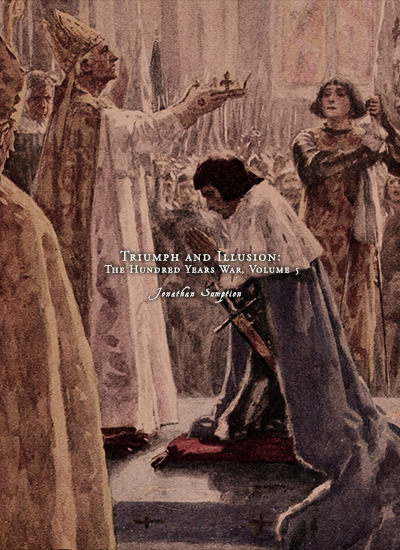
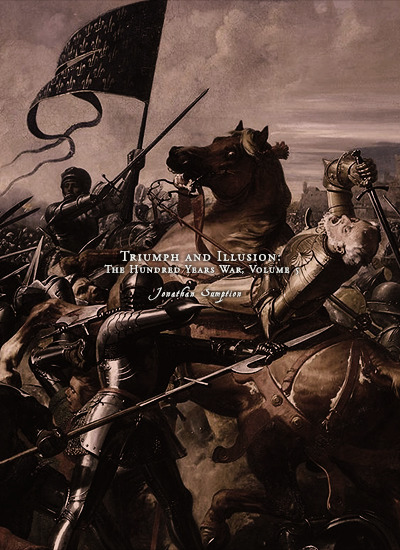
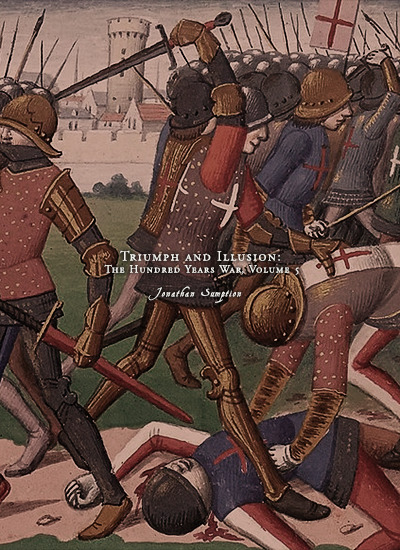
Favorite History Books || Triumph and Illusion: The Hundred Years War Volume 5 by Jonathan Sumption ★★★★☆
The wheel of fortune is one of the most ancient symbols of mankind, an image of capricious fate and the transience of human affairs. In the late middle ages it was everywhere, in illuminated manuscripts, in wall paintings and stained glass, in sermons and homilies, in poetry and prose. ‘The wheel of fortune turneth as a ball, sudden climbing axeth a sudden fall,’ wrote John Lydgate in The Fall of Princes, a work commissioned by one of the dominant figures in this history, Cardinal Henry Beaufort. The present volume traces the remarkable recovery of France in barely two decades from the lowest point of its fortunes to the dominant position in Europe which it had enjoyed before the wars with England. Sudden climbing axeth a sudden fall. These years saw the collapse of the English dream of conquest in France from the opening years of the reign of Henry VI, when the battles of Cravant and Verneuil consolidated their control of most of northern France, until the loss of all their continental dominions except Calais. This sudden reversal of fortune, inexplicable to many contemporary Englishmen, was a seminal event in the history of the two principal nation-states of western Europe. It brought an end to four centuries of the English dynasty’s presence in France, separating two countries whose fortunes had once been closely intertwined. It created a new sense of identity in both of them. In large measure, the divergent fortunes of the French and English states over the following centuries flowed from these events.
The passions generated by ancient wars eventually fade, but those provoked by the wars of the English in fifteenth-century France have proved to be surprisingly durable. The foundations of scholarship on the period were laid by patriotic French historians of the nineteenth century, writing under the shadow of Waterloo and Sedan. The passage of the centuries did nothing nothing to soften their indignation about the fate of their country in the time of Henry VI and the Duke of Bedford. The extraordinary life and death of Joan of Arc defied historical objectivity until quite recently. Joan’s story became the focus of disparate but powerful political passions: nationalism, Catholicism, royalism and intermittent anglophobia. Much of what has been written falsifies history by attributing to medieval men and women the notions of another age. But myths are powerful agents of national identity. The great French historian Marc Bloch once wrote that no Frenchman could truly understand his country’s history unless he thrilled at the story of Charles VII’s coronation at Reims. Writing in the summer of 1940 in the aftermath of a terrible defeat, Bloch looked to an earlier recovery from the edge of disaster for reassurance about the survival of France.
If there is a corresponding English myth, it is in the history plays of Shakespeare. The great speeches which he gave to John of Gaunt and Henry V belong to the classic canon of English patriotism. His three plays about Henry VI, a truncated story of discord at home and defeat abroad, never reach the same heights. Yet they serve to remind us that behind the clash of arms and principles were men and women of flesh and blood. I have tried at every page to remember that they were not cardboard cut-outs. They endured hunger, saddle-sores and toothache. They experienced fear and elation, joy and disappointment, shame and pride, ambition and exhaustion. At the level of government, they were trapped by the logic of war, lacking the resources to conquer or even to defend what they had, and yet unable to make peace. It was the tragedy of the English that, after an initial surge of optimism in the 1420s, they realised that the war could not be won, but were forced to fight on by the memory of Henry V’s triumphs and the incapacity of his son, until disaster finally engulfed them.
#litedit#historyedit#hundred years' war#medieval#history books#french history#english history#european history#history#nanshe's graphics
46 notes
·
View notes
Text
THIS DAY IN GAY HISTORY
based on: The White Crane Institute's 'Gay Wisdom', Gay Birthdays, Gay For Today, Famous GLBT, glbt-Gay Encylopedia, Today in Gay History, Wikipedia, and more …
September 19



1551 – The last French king of the Valois dynasty, Henry III (d.1589) was widely accused of sodomitical relations with his "minions," but such charges probably say more about the viciousness of the political and religious controversies of sixteenth-century France than they do about Henry III.
Christened Alexandre-Édouard soon after his birth on September 19, 1551, he took the name Henry only in 1564. He was the fourth son of Henry II (1519-1559, reigned 1547-1559) and Catherine de Medici (1519-1589). Henry was successively Duke of Angoulême (1551-1560), Duke of Orléans (1560-1566), and Duke of Anjou (1566-1574), before being elected King of Poland in May, 1573. He spent only six months in Poland before the death of his brother Charles IX (1550-1574, reigned 1560-1574) on May 30, 1574 made him King of France.
Henry had the misfortune to reign over a France plunged since 1562 into religious warfare between its Protestant minority and an intolerant Catholic majority. The struggle between the competing religions threatened the prestige, stability, and authority of the French monarchy. Henry III was a hard-working administrator and proponent of a centralized monarchical state at a time when France's great nobles still claimed considerable local authority.
Henry III faced considerable opposition, and scurrilous pamphlets denounced him for tyranny, heresy, and sexual depravity. Many of Henry's contemporaries expressed disgust with his personal conduct, especially his love of jewelry, his occasional transvestism (in the context of masked court balls) , and particularly his marked affection for his so-called "minions," a loyal band of youthful courtiers rumored to be his lovers. Many historians interpret Henry's alleged effeminacy and homosexuality as symptomatic of monarchical decadence. But the only evidence for Henry's homosexuality is court gossip and attacks by the king's critics, at first his Protestant enemies, then the fanatical Catholic League, which demanded that Henry take a harder line against Protestantism, as well as nobles from France's great houses, who resented the influence of favorites from lesser families.
Sodomy was never the only accusation levelled against the king. As David Teasley has shown, contemporary propaganda "associated [the king's reputed sodomy] with a host of other sins: irreligion, atheism, sorcery, treason, rape, tyranny, monstrous animalistic behaviour, and the killing of children."
The charges of sodomy should probably be seen as no more than an indication that many people viewed the king's political and religious policies to be subversive of the natural order. Jacques Clément, a Dominican monk convinced that he was doing God's work, assassinated Henry III on August 1, 1589. His Protestant cousin, Henry of Navarre, succeeded him as Henry IV (1553-1610, reigned 1589-1610), but managed to impose his rule only after a long civil war and conversion to Catholicism.
For a long time after his death, Henry was assumed to have been homosexual or at least bisexual. The scholar Louis Crompton provides substantial contemporary evidence of Henry III's homosexuality, and the associated problems at court and politics. Despite this, it is still disputed.
For example, some modern historians, such as P. Erlanger, J. F. Solnon, Nicolas Le Roux, and J. Boucher found evidence to support the idea that Henry was not homosexual (though still perhaps bisexual), as he had many famous mistresses. They found that there were no men named with whom he could have had sex, and that he was well-known at the time for his taste in beautiful women. They concluded that his supposed homosexuality was based on his dislike of war and hunting being interpreted as effeminate, an image cultivated by political opponents (both Protestants and Catholics) to turn the opinion of the French people against him.
Most recently, Gary Ferguson has offered a detailed assessment of Henri III and his court, in the context of a discussion of the question of homosexuality in the French Renaissance.
In 1570, discussions commenced to arrange for Henry to court Elizabeth I of England. Elizabeth, almost 37, was in need of a husband in order to produce an heir. However, nothing came of these discussions. Elizabeth is viewed by historians as having intended only to arouse the concern of Spain, rather than to have seriously contemplated marriage. The chance of marriage was further blighted by their differing religious views - Henry was at least formally a Catholic while Elizabeth was a Protestant - and his opinion of Elizabeth. Henry tactlessly referred to Elizabeth as a putain publique (a "public whore") and made stinging remarks about their difference in age. Upon hearing (inaccurately) that she limped because of a varicose vein, he called her an "old creature with a sore leg"


1883 – Hjalmar Bergman (d.1931 in Berlin, Germany) was a Swedish writer and playwright.
The son of a banker in Örebro, Bergman briefly studied philosophy at Uppsala University but soon broke off his studies and took up the life of a free writer.
He married Stina Lindberg, the daughter of actor and stage producer August Lindberg and Augusta Lindberg, and sister of Per Lindberg. A complicated and unhappy union, the marriage heightened rather than lessened Bergman’s anxieties. Stina became his love-hate object in his rebellion against authority while he gappled with his homosexuality. His love of young boys and his long, open relationship to Werner Fütterer, a 14-year old German schoolboy when they first met in 1922, did nothing to improve this marriage.
Up to his father's death in 1915 Bergman was heavily sponsored by the family patriarch; after the old man died from a stroke it turned out that the family business had become highly indebted and Bergman was forced to start making money out of his writing and court readers in a more outgoing and more entertaining manner. He rose to the challenge and in the following ten years reached the peak of his work.
Much of his output takes place in a small town in mid-Sweden, which is growing into a parallel universe in a Balzacian manner. The shameful secrets of a dozen of interwoven families gradually come out of the closet as the stories grow increasingly symbolic. A pessimistic outlook is always counterbalanced by a grotesque humour – indeed in a book like Markurells i Wadköping the latter almost succeeds in completely shading the former.
After an unsuccessful bout as a manuscript writer in Hollywood, Bergman's alcoholism and narcotics abuse took over, from which he died prematurely; his final novel Clownen Jac mirrors his awareness of his drift into self-destruction as well as his belief in the honesty and purpose of artistic spectacle.


1934 – The "fifth Beatle," manager Brian Epstein (d.1967), also managed numerous other groups like Gerry & The Pacemakers, Billy J. Kramer and the Dakotas, and solo artists like Cilla Black. The Beatles recorded a demo in Decca's studios — paid for by Epstein — which he later persuaded George Martin to listen to. Epstein was then offered a contract (after Martin had auditioned the group) by EMI's small Parlophone label, even though they had previously been rejected by almost every other British record company.
Perhaps few individuals were less likely to create the public image and oversee the career of the world's most famous rock group than Brian Epstein. Born into a family of affluent Liverpool Jewish furniture merchants, Epstein seemed destined for a career in their business. He was attracted, however, to such 'unmanly' pursuits as fashion design and the stage, which, along with his closeted homosexuality, put him at odds with his family's aspirations.
Epstein left school at sixteen to work at one of his family's stores until he was called up for military service in 1952. While Epstein was in the Army, he had a tailor make an officer's uniform for him that he wore when cruising the bars of London, but was arrested one night (for impersonating an officer) at the Army and Navy Club in Piccadilly by the Military Police. Epstein managed to avoid a court martial by agreeing to see an army psychiatrist, who uncovered Epstein's sexuality. He was discharged from the army after 10 months on the medical grounds of being "emotionally and mentally unfit", although Epstein later stated that his first homosexual experience was after he returned to Liverpool. Epstein then spent a year studying acting at teh Royal Academy of Dramatic Arts, but dropped out shortly after his arrest for "persistent importuning" outside a men's public toilet in Swiss Cottage, London.
He returned to his family's business, where he became the manager of the store's record department. It was in this capacity that, in October 1961, he first heard of the Beatles, a Liverpool band whose fans were seeking their recordings. Epstein was unable to locate these records and, intrigued by the mystery, ventured into the Cavern Club, where he encountered John Lennon, Paul McCartney, George Harrison, and then-drummer Pete Best.
Within two months, although he had no entertainment or managerial background, Epstein had signed the group to a contract. Over the next year, he transformed the group's image from that of leather-clad ruffians to 'Mods' attired in fashionable suits with longish hairstyles, creating, in effect, an androgynous look for his protégés. Epstein also successfully negotiated the Beatles' first recording contract with EMI Parlophone, replaced Best with Ringo Starr.
Though Epstein was homosexual, it was not publicly known until a long time after his death, although it was an open secret among his friends and business associates. By 1964, when the Beatles and his other acts took America by storm, Epstein seemed to personify worldly success. He was, however, living in an almost constant state of anxiety lest his homosexuality - and his attraction to rough and often abusive young men - become public knowledge, as male homosexual acts were still illegal in Britain and any scandal might negatively affect the Beatles' career.
It has often been suggested that Epstein's devotion to the Beatles was based on an unrequited love for John Lennon. Speculation about a possible affair between them has existed since the two holidayed together in Spain in 1963.

Epstein with the Beatles
Paul McCartney said that he and the other Beatles knew that Epstein was a homosexual, but they did not care, because Epstein greatly encouraged them when record companies turned them down, and used to take them to late-night drinking clubs they had previously never had access to. Although John Lennon often made sarcastic comments about Epstein's homosexuality to friends and to Epstein personally, nobody outside their closed circle was allowed to comment on it. Ian Sharp — one of Lennon's art school friends — once made a sarcastic remark about Epstein but was sent a letter by Epstein's office within forty-eight hours that demanded a complete apology. Sharp apologized but was then completely ostracized, and was told by McCartney in a letter to have no contact at all with any of them in the future.
There were rumors of a brief sexual encounter between Lennon and Epstein when they both went on a four-day holiday together to Barcelona, Spain in April 1963. Lennon always denied this, telling Playboy in 1980: "It was never consummated, but we had a pretty intense relationship." Lennon's first wife Cynthia also maintains that Lennon's relationship with Epstein was platonic. A fictionalized account of the Spanish holiday was portrayed in the film 1991 The Hours and Times. Lennon's friend and confidant, Peter Shotton, claimed in his book, The Beatles, Lennon and Me, that under provocation from Epstein, Lennon did partly give in: "I let him toss me off, and that was it." Biographer Hunter Davies also recalled Lennon telling him he had consented to an encounter "to see what it was like." Writer Albert Goldman expanded on both claims in his The Lives of John Lennon, alleging a longtime affair between the two men.
Epstein died of an accidental drug overdose at his home in London in August 1967. The Beatles' early success has been attributed to Epstein's management and sense of style. Paul McCartney said of Epstein: "If anyone was the Fifth Beatle, it was Brian."


1942 – Paul Huson is a British-born author and artist currently living in the United States. In addition to writing several books about occultism and witchcraft he has worked extensively in the film and television industries.
Huson was born in London, the son of the author Edward Richard Carl Huson and painter and motion picture costume designer Olga Lehmann. Huson attended Leighton Park School from 1956 through 1959, then entered the Slade School of Fine Art at the University of London as a Diploma student from 1959 through 1963, with a principal in painting under Andrew Forge and a subsidiary in theatrical design under Nicholas Georgiadis and Peter Snow. In 1963 he was awarded an Associated Rediffusion Scholarship to study film under Thorold Dickinson for a further post graduate year.
After a walk-on role in René Clément's film starring Gerard Phillipe, Monsieur Ripois, Huson acted in Laurence Olivier's film of Richard III playing the part of Edward, Prince of Wales, one of the two Princes in the Tower.
From 1965 through 1968 Huson worked as an art director for BBC television and Columbia Pictures, UK, before emigrating to the United States, where he began writing books and stories and scripts for American television, which included the television series Family and James at 15. Between 1982 and 1987 he and his life-partner William Bast wrote and produced three television series Tucker's Witch, The Hamptons, and The Colbys (a spin-off of the Aaron Spelling series Dynasty); The Colbys won the 1986 People's Choice Award. In 1989 he and Bast wrote a two-part series Twist of Fate, followed in 1991 by The Big One: the Great Los Angeles Earthquake, another two-parter, which was instrumental in alerting Los Angeles to their inadequate earthquake response arrangements at that time. In 1995 Huson and Bast wrote the teleplay for Danielle Steel's popular novel Secrets. In 1995 they wrote Deadly Invasion: The Killer Bee Nightmare; a paranormal thriller The Fury Within; and Power and Beauty, a controversial biographical teleplay about socialite Judith Exner and her relationship with President John F. Kennedy.
Huson subsequently wrote a number of popular books on occult and allied subjects: the influential Mastering Witchcraft (1970) a study of tarot symbolism The Devil's Picturebook (1971); Mastering Herbalism (1974); an introduction to parapsychology How to Test and Develop your ESP (19750); two novels, The Keepsake (1981), and The Offering (1984), and a second work on tarot symbolism and the history of tarot reading, Mystical Origins of the Tarot (2004). He generally illustrates his non-fiction books himself, and designed a deck of tarot cards based upon his research, Dame Fortune's Wheel Tarot (2009).
Huson lives in Los Angeles. His frequent collaborator and lover for forty-nine years was William Bast, until Bast's death in 2015.


1967 – Riyad Vinci Wadia (d.2003) was an Indian independent filmmaker from Bombay, known for his film, BomGay (1996) which is regarded as one of the very first gay themed movies from India. Born into the filmmaking Wadia family, he inherited the production company Wadia Movietone which is known for the Fearless Nadia movies which are one of their kind in the superwoman genre when the other movies of their time usually portrayed women in submissive roles. Wadia is also known for his documentary on Nadia, Fearless: The Hunterwali Story.
Riyad did his schooling in Bombay and later went to Australia for a course in filmmaking. Riyad was openly gay and so was his brother Roy Wadia, who was working for the World Health Organization.
The short film, BomGay, with shooting locations such as the gay cruising spots of Victoria Terminus urinals and the Bombay local tracks along which people defecate, was described as "part Bollywood, part Genet". The film explored the underground gay subculture of Bombay and marked the entry of queer themes into Indian Cinema. The film had a limited release in India, thanks to its explicit content. It got screened in a number of international film festivals and finds mention in the research works on the history of queer themes in Indian Cinema as the first queer themed film from India
Riyad tested positive for HIV in 1995. Though he was quite capable of affording the then expensive HIV medication, he refused to be on any kind of dosage. He left India shortly after the production of BomGay, supporting himself with petty jobs in New York and writing an article or two for The New Indian Express. Things got difficult post 9/11, with not many jobs available, forcing him to get back to Bombay. Riyad died of stomach tuberculosis on November 30, 2003, in Bombay. He was then in the process of generating funds for his first full length film (unfinished), Naked Rain, based on R. Raj Rao's novel, Boyfriend.


1980 – Tegan and Sara Quin are identical twin sisters. They are also are a Canadian indie rock duo formed in 1995 in Calgary, composed of Tegan Rain Quin and Sara Keirsten Quin). Both play the guitar and keyboards, and write their songs.
Born in Calgary, Alberta, they began playing guitar and writing songs at age 15, forming a band called Plunk without a drummer or bass player. In 1997, they used their school's recording studio to record two demo albums: Who's in Your Band? and Play Day. In 1998, they won Calgary's Garage Warz competition, using the studio time they won to record their first professional demo, Yellow tape, which was followed by Orange tape and Red tape.
Two songs from Red tape appeared on their first album, Under Feet Like Ours, which they released independently in 1999 under the name "Sara and Tegan". They later changed their name to "Tegan and Sara" because it was easier to pronounce and because they wanted their name to stand out amongst the other "Sara" musicians at the time such as Sarah McLachlan and Sarah Slean. They reprinted their first album under the name Tegan and Sara. Neil Young's manager signed them to Young's Vapor Records label and they released This Business of Art through Vapor in 2000. They have toured extensively since then.
Tegan and Sara began touring after graduating from high school in 1998, travelling by car or Greyhound bus. In 2000, they toured with Neil Young and The Pretenders. Other notable touring mates include Ryan Adams, Weezer, Bryan Adams, Jack Johnson, The Black Keys, Ben Folds, Gogol Bordello, Cake, City and Colour, Death Cab for Cutie, Hot Hot Heat, The Killers, New Found Glory, Paramore, Rufus Wainwright, Eugene Francis Jnr, The Jezabels, An Horse, Steel Train, Holly Miranda, Speak and Diana.
In 2012, Tegan and Sara started recording their seventh studio album, Heartthrob. The first single, "Closer", was released on September 25, 2012. The album was released on January 29, 2013 and debuted on the Billboard top 200 at number 3, the bands highest charting record to date, selling 49,000 copies in its first week. Heartthrob debuted at number 2 on the Canadian chart, digital downloads chart and hit number 1 on the rock and alternative album charts. In July 2013, the album was shortlisted for the 2013 Polaris Music Prize.
Both twins are openly gay. Tegan lives in Vancouver, British Columbia and also in Los Angeles, California, with her girlfriend, who is a photographer; they have been dating since 2008. Sara lives in Montreal, Quebec, and also in New York City with her girlfriend; they have been dating since 2011.


1988 – Greg Louganis suffers a head injury while qualifying for the Seoul Olympics; goes on to win two Gold medals ... and the hearts of almost every gay man everywhere.


12 notes
·
View notes
Text


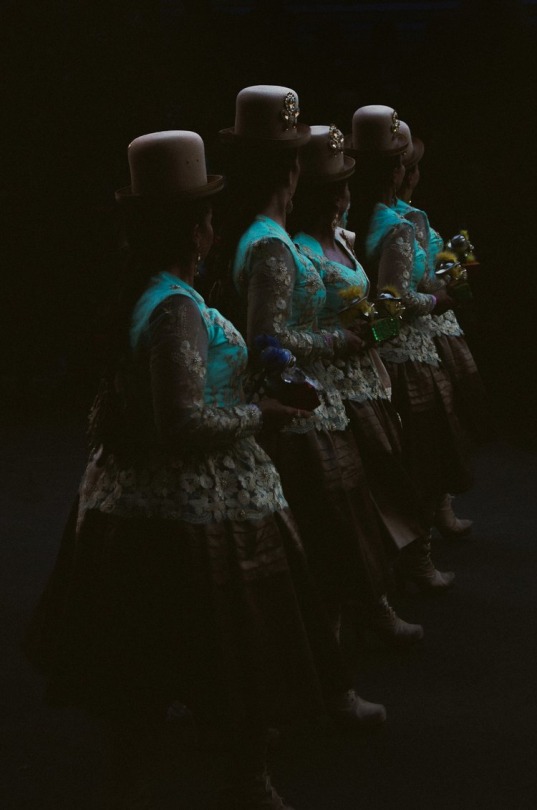

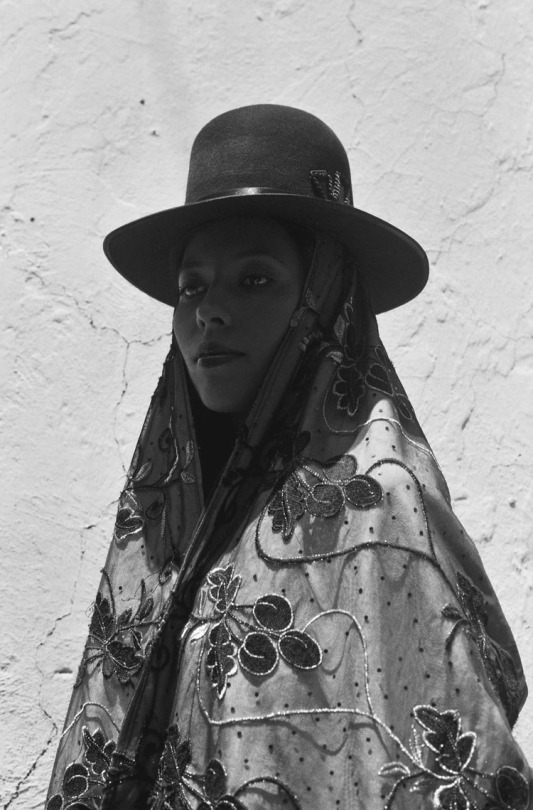
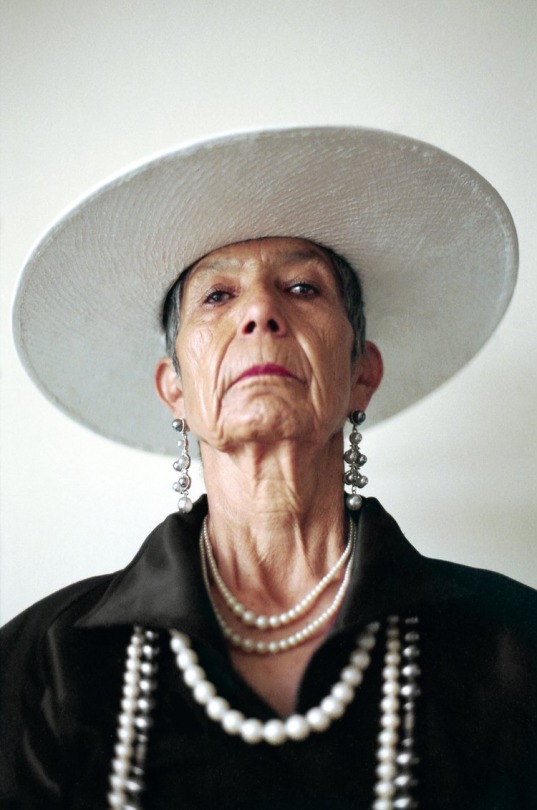
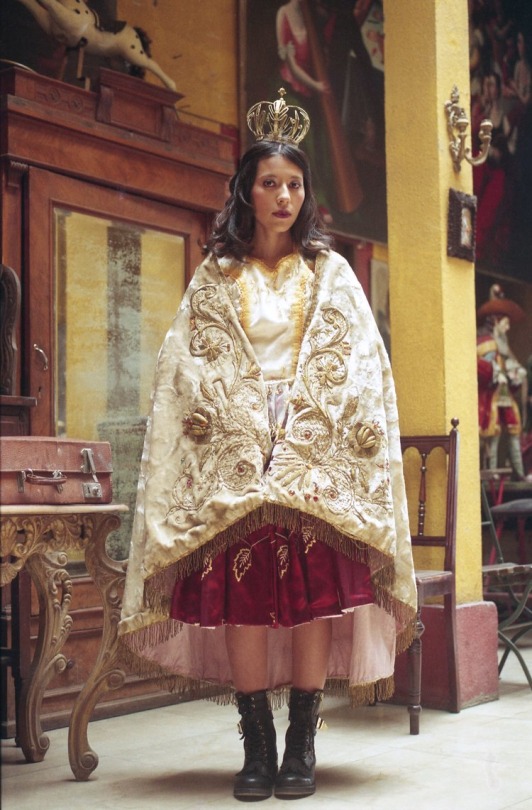

MADRE
Marisol Mendez
Although Bolivia is a pluricultural country with a rich loom of femininity, the representation of women remains whitewashed and phallocentric. To this day, Catholicism and class struggles permeate our understanding of womanhood with Catholic dogmas reinforcing society's Madonna-Whore complex and inequality manifesting as the under and misrepresentation of indigenous and mestizo women. MADRE was conceived to challenge this embedded machismo and celebrate the diversity and complexity of my culture through the portrayal of its women. The project became a cathartic experience that allowed me to (re)connect to my female lineage and through it (re) invent the history of Bolivia.
#marisol mendez#bolivia#art#arte#arte latinoamericano#photography#fotografía#fotografía latinoamericana#women in photography
310 notes
·
View notes